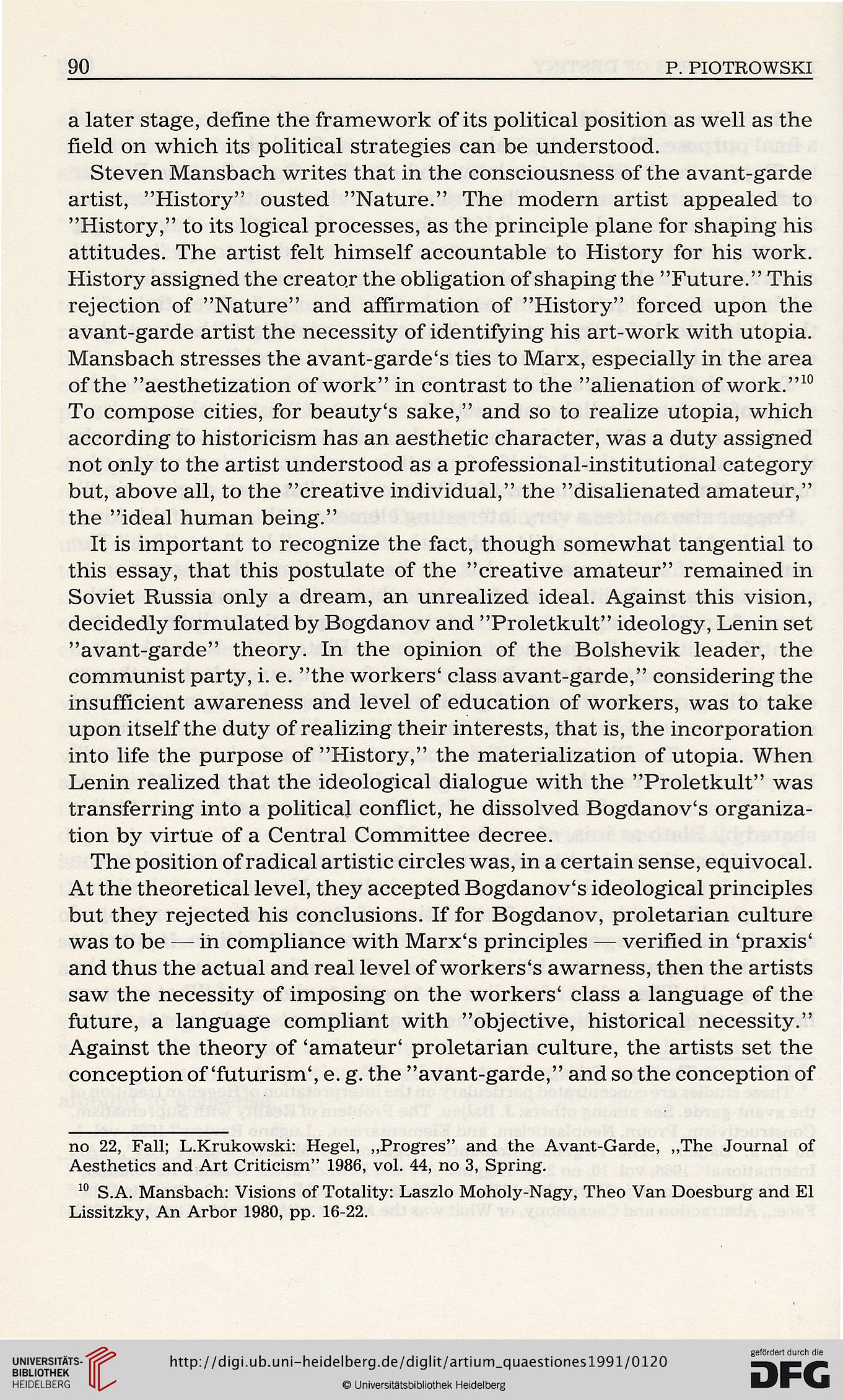90
P. PIOTROWSKI
a later stage, define the framework of its political position as well as the
field on which its political strategies can be understood.
Steven Mansbach writes that in the consciousness of the avant-garde
artist, "History" ousted "Nature." The modern artist appealed to
"History," to its logical processes, as the principle plane for shaping his
attitudes. The artist felt himself accountable to History for his work.
History assigned the creator the obligation of shaping the "Future." This
rejection of "Nature" and affirmation of "History" forced upon the
avant-garde artist the necessity of identifying his art-work with utopia.
Mansbach stresses the avant-garde's ties to Marx, especially in the area
of the "aesthetization of work" in contrast to the "alienation of work."*"
To compose cities, for beauty's sake," and so to realize utopia, which
according to historicism has an aesthetic character, was a duty assigned
not only to the artist understood as a professional-institutional category
but, above all, to the "creative individual," the "disalienated amateur,"
the "ideal human being."
It is important to recognize the fact, though somewhat tangential to
this essay, that this postulate of the "creative amateur" remained in
Soviet Russia only a dream, an unrealized ideal. Against this vision,
decidedly formulated by Bogdanov and "Proletkult" ideology, Lenin set
"avant-garde" theory. In the opinion of the Bolshevik leader, the
communist party, i. e. "the workers' class avant-garde," considering the
insufficient awareness and level of education of workers, was to take
upon itself the duty of realizing their interests, that is, the incorporation
into life the purpose of "History," the materialization of utopia. When
Lenin realized that the ideological dialogue with the "Proletkult" was
transferring into a political conflict, he dissolved Bogdanov's organiza-
tion by virtue of a Central Committee decree.
The position of radical artistic circles was, in a certain sense, equivocal.
At the theoretical level, they accepted Bogdanov's ideological principles
but they rejected his conclusions. If for Bogdanov, proletarian culture
was to be — in compliance with Marx's principles — verified in 'praxis'
and thus the actual and real level of workers's awarness, then the artists
saw the necessity of imposing on the workers' class a language of the
future, a language compliant with "objective, historical necessity."
Against the theory of 'amateur' proletarian culture, the artists set the
conception of'futurism', e. g. the "avant-garde," and so the conception of
no 22, Fall; L.Krukowski: Hegel, ,.Progres" and the Avant-Garde, „The Journal of
Aesthetics and Art Criticism" 1986, vol. 44, no 3, Spring.
S.A. Mansbach: Visions of Totality: Laszlo Moholy-Nagy, Theo Van Doesburg and El
Lissitzky, An Arbor 1980, pp. 16-22.
P. PIOTROWSKI
a later stage, define the framework of its political position as well as the
field on which its political strategies can be understood.
Steven Mansbach writes that in the consciousness of the avant-garde
artist, "History" ousted "Nature." The modern artist appealed to
"History," to its logical processes, as the principle plane for shaping his
attitudes. The artist felt himself accountable to History for his work.
History assigned the creator the obligation of shaping the "Future." This
rejection of "Nature" and affirmation of "History" forced upon the
avant-garde artist the necessity of identifying his art-work with utopia.
Mansbach stresses the avant-garde's ties to Marx, especially in the area
of the "aesthetization of work" in contrast to the "alienation of work."*"
To compose cities, for beauty's sake," and so to realize utopia, which
according to historicism has an aesthetic character, was a duty assigned
not only to the artist understood as a professional-institutional category
but, above all, to the "creative individual," the "disalienated amateur,"
the "ideal human being."
It is important to recognize the fact, though somewhat tangential to
this essay, that this postulate of the "creative amateur" remained in
Soviet Russia only a dream, an unrealized ideal. Against this vision,
decidedly formulated by Bogdanov and "Proletkult" ideology, Lenin set
"avant-garde" theory. In the opinion of the Bolshevik leader, the
communist party, i. e. "the workers' class avant-garde," considering the
insufficient awareness and level of education of workers, was to take
upon itself the duty of realizing their interests, that is, the incorporation
into life the purpose of "History," the materialization of utopia. When
Lenin realized that the ideological dialogue with the "Proletkult" was
transferring into a political conflict, he dissolved Bogdanov's organiza-
tion by virtue of a Central Committee decree.
The position of radical artistic circles was, in a certain sense, equivocal.
At the theoretical level, they accepted Bogdanov's ideological principles
but they rejected his conclusions. If for Bogdanov, proletarian culture
was to be — in compliance with Marx's principles — verified in 'praxis'
and thus the actual and real level of workers's awarness, then the artists
saw the necessity of imposing on the workers' class a language of the
future, a language compliant with "objective, historical necessity."
Against the theory of 'amateur' proletarian culture, the artists set the
conception of'futurism', e. g. the "avant-garde," and so the conception of
no 22, Fall; L.Krukowski: Hegel, ,.Progres" and the Avant-Garde, „The Journal of
Aesthetics and Art Criticism" 1986, vol. 44, no 3, Spring.
S.A. Mansbach: Visions of Totality: Laszlo Moholy-Nagy, Theo Van Doesburg and El
Lissitzky, An Arbor 1980, pp. 16-22.




